- Home
- Alan Bennett
Alan Bennett: Plays, Volume 1 Page 5
Alan Bennett: Plays, Volume 1 Read online
Page 5
(HUGH fiddles with the wireless and turns it to Happxdrome, a wartime radio programme, and the music plays under the dialogue.)
NURSIE: How many more times do I have to tell you, don’t play with that wireless. See! I’ve just put a new accumulator in and it’s got to last me for the duration.
MOGGIE: I heard a joke in the canteen today. What did Hitler say when he fell through the bed?
NURSIE: I don’t know. What did Hitler say when he fell through the bed?
MOGGIE: At last I’m in Po-land.
(The HEADMASTER strides on to the stage and stands in wordless accusation looking at MATRON.)
HEADMASTER: I must apologize to all parents.
BOYS: (In chorus)
Willy, Willy, Harry Stee
Harry Dick John Harry Three
One two three Neds
Richard two
Henries four five and six
Then who?
Tudor Henries seven and eight
Edward Mary and Elizabeth
James, Two Charles’, James again
William and Mary, Anne the plain
Four Georges from Hanover
William Four Victoria.
SCHOOLMASTER (TEMPEST): And who came after Queen Victoria? Rumbold.
RUMBOLD: I don’t know sir.
SCHOOLMASTER: Someone once said, Rumbold, that education is what is left when you have forgotten all you have ever learned. You appear to be trying to circumvent the process by learning as little as possible. Wigglesworth?
WIGGLESWORTH: Edward, sir.
SCHOOLMASTER: Edward what?
WIGGLESWORTH: Edward VII, sir.
SCHOOLMASTER: And who came after Edward VII … they all did. And what do we know of Edward VII. Who haven’t I asked? Rumbold? Nothing. He knew nothing of Queen Victoria. He knows nothing of Edward VII. You are a stupid boy, Rumbold, but by God you’re a consistent one. Anybody?
WIGGLESWORTH: He was fat, sir.
SCHOOLMASTER: No, Wigglesworth, Edward VII was not fat. He was very fat. Not all the art and device of the tailor could disguise the fact that Edward VII was an enormously fat man. Cosseted and indeed corseted from a very early age …. Are you taking this down? … he grew almost by a process of geometrical progression as year succeeded year. Pleat, ruche and gusset him how they would he yet remained enormous, how enormous we can see from our wall map of Edward VII. Whence came this vast and ever-broadening girth? It was not heredity for at eighty-one his mother Queen Victoria was very small for her age. One reason behind his fatness and behind the fatness of his behind – that’s not funny, Wigglesworth – was that he ate perhaps more than four times as much as the majority of his subjects. For some this was a boon in disguise for each year upon the anniversary of his birth he was weighed in potatoes which were then fried and distributed to the lower classes. His fatness affected his health. A loyal subject wrote in to suggest he attach balloons to his elbows to take the weight off his legs.
(For some time there has been the sound of distant singing, apparently of a psalm, it grows louder and louder until the words are discernible sung in tipsy, hearty voices to the tune and metre of a psalm.)
BOYS: As I was walking down the street, I saw a house on fire, And at the window’s first storey, a face, a human face
Crying Help, Help, I am on fire.
We said, Jump, you silly bastard
Because we have a blanket.
He jumped, hit the deck and broke his stupid neck,
Because we had no blanket.
Laugh, how we laughed,
The tears ran down our trouser legs
I haven’t laughed so much since Grandma died
And Aunty Mabel caught her left titty in the mangle
And whitewashed the ceiling.
Sinners, miserable sinners.
TEMPEST: What is all this din, Charteris? Is it in the script?
CHARTERIS: No, sir. It’s the rugger team.
TEMPEST: Is it?
(FRANKLIN walks purposefully across the stage towards the rear.)
FRANKLIN: Go on, man. Don’t stop for God’s sake.
HEADMASTER: Franklin. Franklin. What is happening. Tempest, what is this hiatus in the proceedings?
TEMPEST: Mr Franklin’s gone out to try and stop the singing, Headmaster.
HEADMASTER: Stop it? Do you mean to say it’s not part of the entertainment?
TEMPEST: Oh no. It’s entirely spontaneous.
HEADMASTER: Spontaneous? Then it must be stopped at once. Go out there and stop it.
TEMPEST: Me, sir? Wild horses on their bended knees would not get me out there.
(Enter FRANKLIN, dragging TREDGOLD, the beefy Captain of Games, by his collar.)
FRANKLIN: Come on, you grubby barbarian.
HEADMASTER: Now then, Franklin, who’s been acting the giddy goat? You, Tredgold. You should know better than this, Tredgold … a school prefect, captain of games, father a governor of the school. Oh, Tredgold, you disappoint me.
TREDGOLD: I do apologize, sir, but it’s the rugger team just back from Stowe … we licked them, sir, 17: 6.
HEADMASTER: O, dismal youth, with your boots knocking about your neck, it’s all very well to apologize … 17: 6! O, Tredgold, well done! Well done! Take your hand off Tredgold’s collar, Franklin, School prefect, captain of games, father a governor of the school … doesn’t need you hanging on to his collar. I think a short prayer might not come amiss. Ο God. Let us give thanks for the warm embrace of the sun and the chaste kiss of the rain, thanking Thee as we match our splendid young limbs against each other in the rough and the tumble of our games together, so that at the last, rain-washed, sun-gilded, heaven-bent, we may repose upon Thine eternal changelessness and thus at the last when we are called to go whither we know not hence, we may see God … you won’t find him down there, Tupper … and bask in the presence of His glory from henceforth unto henceforth. Amen. Seventeen six. Amen. Amen.
TREDGOLD: I think they’d appreciate it, sir, if you spoke to them.
HEADMASTER: Do you think so. Certainly, certainly, I’ll speak to them at once. Seventeen six!
FRANKLIN: Tredgold, you privileged great lout, kindly inform your little Male Voice Choir, that if I ever get my hands on them they’ll be singing several octaves higher. (FRANKLIN, TREDGOLD and the HEADMASTER exit.)
TEMPEST: This is all very vexing.
WIGGLESWORTH: Can’t we go out and join them, sir?
TEMPEST: Certainly not. Get back in your places. And stop messing about.
WIGGLESWORTH: Aw, sir. Come on. It’s only the play, sir.
TEMPEST: Only the play! Only the play! Wigglesworth.
Fumbling, uncertain, pathetic though our attempts may be, we are here engaged in the highest activity known to man, which is not, Wigglesworth, rugby football. We are about the business of art. There have always been people like you, Wigglesworth, down the ages, people who say: Oh, it’s only the play. It was doubtless a fifteenth-century Florentine Wigglesworth who came up to da Vinci and said, Why don’t you make her laugh on the other side of her face, Leonardo. Oh, Picasso, she’s got eyes in the back of her head. Oh, Dostoievsky, you do look on the dark side. You mindless twirp. Here we are trying to salvage something from the Wreck of Time and you say it’s only the play. (The rugger team now come in at the rear and embark on another song. They come forward to the front of the stage, passing a rugger ball among themselves, feinting passes to the audience. All the boys gradually join in the song, the first verse of which is sung by the team alone, the second as a treble solo and the last by the whole school with organ accompaniment.)
BOYS: (To the tune of ‘The Church’s One Foundation’)
The dogs they had a party
They came from near and far
And some dogs came by aeroplane
And some dogs came by car
They came into the courtroom
And signed the visitors’ book
And each dog took his arsehole
&n
bsp; And hung it on a hook.
The dogs they all were seated
Each mother’s son and sire
When a dirty little mongrel
Got up and shouted Fire!
The dogs they were in a panic
They had no time to look
And each dog took his arsehole
From off the nearest hook.
The dogs they were so angry
For it was very sore
To wear another’s arsehole
You never wore before
And that it is the reason
Why a dog will leave its bone
To sniff another arsehole
In the hope it is his own.
FRANKLIN: Get out of my sight, the lot of you, before I strangle you in your own bootlaces.
HEADMASTER: Tredgold, keep them under wraps, old chap. Take them behind the fives courts where they can sing to their hearts’ content.
I’d better say at this juncture, Franklin, that I’m not entirely pleased with the way things are going.
FRANKLIN: I refuse to be held responsible for a coachload of drunken louts who…
HEADMASTER: I wasn’t referring to that. Boy nature filling its lungs and shouting forth its full throated praise of physical prowess, no harm in that. I was eighteen myself once.
FRANKLIN: I should want witnesses of that.
HEADMASTER: No. There’s an element of mockery here I don’t like. I don’t mind your tongue being in your cheek, but I suspect your heart is there with it.
FRANKLIN: You can’t expect to agree with everything. One generation treading on the toes of its predecessors. That is what tradition means.
HEADMASTER: I am still Headmaster. Do not try to tell me what tradition means. You shouldn’t be doing that, MacIlwain. Nail-biting is the act of a beast. Anyway, get on. Where are all your actors? It’s all a bit too slip-shod. They ought to be here. We shouldn’t have to hang about waiting. Whose turn is it now?
FRANKLIN: Yours, Headmaster.
HEADMASTER: Precisely and where is … mine? Mine? Of course it is. Clear the stage then. Clear the stage. I can’t start with you dogging my every footstep.
(CHARTERIS alters the hymn board to 1909.)
LECTERN: Τ. Ε. Lawrence sets out for Mesopotamia, 1909. He had a spare shirt, and stockings, a camera and a borrowed map. He was twenty-one. And he was going ostensibly to search for material for a thesis on Crusader Castles. It was the start of a longer search. There is a certain strain in the English, delicate, fastidious, self-despising, which draws some of them to the Arabs, drives them to adopt their code of chivalry, courtesy, and cruelty, and thus obtain the franchise of the desert. Such people are tough, awkward and they are not modest. Masculine women and feminine men, they count the appetite a sin and the flesh a luxury. They strip themselves to the bone. They become soldiers, explorers and indefatigable travellers. But these are just names and excuses and in their various disguises they are all pilgrims.
HEADMASTER: (Slide 1. Portrait of T. E. Lawrence) Τ. Ε. Lawrence, the man and the myth. Which is man and which is myth? Is this fact or is it lies? What is truth and what is fable? Where is Ruth and where is Mabel? To some of these questions I hope to be able to provide the answer. No one who knew Τ. Ε. Lawrence as I did, scarcely at all, could fail but to be deeply impressed by him. It is given to few men to become as he did, a legend in his own lifetime, and it was in pursuit of that legend that I first sought him out in June of 1933 at his cottage at Clouds Hill in Dorset. (Slide 2. Picture of Clouds Hill.)
It was a simple cottage but I thought I detected Lawrence’s hand in the rough white-washed wall, the stout paved doorstep and the rough oak door, upon which I knocked, lightly. It was opened by a small, rather unprepossessing figure slight of frame, fair-haired and with the ruddy gleaming face of a schoolboy. It was a schoolboy. I had come to the wrong house.
(Slide 3. Desert picture. Upside down.)
Some of us are a little old to stand on our heads, Crabtree. Thank you.
I knew of Lawrence of course from his exploits in Syria, where he had been attached, though none too deeply, to British Expeditionary Force. Speaking fluent Sanskrit he and his Arab body servant, an unmade Bedouin of great beauty, had wreaked havoc among the Turkish levies. Aurens the Arabs called him for they are unable to pronounce their L’s as distinct from the Chinese who can pronounce little else.
It is interesting, though fruitless, to speculate that had fate taken him to China he would have been known as Lollens. However, that is by the way.
(Slide 4. Picture of an Eastern person.)
It was at this time he was taken for a Circassian eunuch by the infamous Sheikh Hans and subjected to unspeakable privations, the mark of which he bore for the rest of his life, and which bored everyone else thereafter.
(Slide 5. Τ. Ε. Lawrence in Arab dress.)
Shaw, or Ross as Lawrence then called himself, returned from the East in 1919. Shyness had always been a disease with him, and it was shyness and a longing for anonymity that made him disguise himself. Clad in the magnificent white silk robes of an Arab prince, with in his belt the short curved, gold sword of the Ashraf descendants of the Prophet, he hoped to pass unnoticed through London. Alas, he was mistaken. ‘Who am I?’ he would cry despairingly. ‘You are Lawrence of Arabia’ passers-by would stop him and say, ‘And I claim my five pounds’. For a while he sought refuge in academic seclusion as a fellow of All Souls in Oxford.
(Slide 6. Τ. Ε. Lawrence at All Souls in Oxford.)
Here he could mix on equal terms with some of the greatest men of his age, but, as Robert Graves has noted, he could not bear to be touched, so that even to rub shoulders with the great filled him with deep loathing.
(Slide 7. A smiling picture of T. E. Lawrence.)
One hesitates to talk of Lawrence and his body, though the two were inseparable. He feared his body as a savage fears the night. His body was a wild beast to be tamed and cowed into submission, and when I first knew him it had been beaten and tanned to the texture of an old whip. There have been those, as there always are those, who have said that there was something feminine about his make-up, but his was always so discreet.
But can one ever forget him, those china blue eyes, that boyish, almost girlish figure and that silly, silly giggle. The boys at his school had called him Tee Hee Lawrence, and always at the back of his hand or the back of his mind there was that ready snigger.
When I became headmaster the first boy I ever expelled was for reading the works of Lawrence. This morning I receive in my post a letter from the Oxford and Cambridge Matriculation Board telling me that the works of Lawrence are next year’s set texts. I just can’t keep up.
FRANKLIN: D. H. not Τ. Ε.
HEADMASTER: Oh, these literary fellows, they’re all the same.
RADIO: (A broadcast of Robb Wilton’s monologue beginning ‘The day war broke out, my missus said to me…’ This is interrupted by an announcement) We are interrupting this broadcast for a message of national importance. At three o’clock this afternoon the Admiralty issued the following appeal: ‘All yachtsmen and owners of sea-going craft in the neighbourhood of the Channel Ports are asked to report to their respective harbour masters without delay. Ships should be sea-worthy and capable of immediate active service.’ That is the end of the announcement.
(HUGH is holding a telegram.)
HUGH: But he’s missing, Nursie.
NURSIE: Missing? Missing? That’s him all over. Never there when he’s wanted, that boy. He’ll turn up.
HUGH: They said at the War Office somebody saw him still on the beach when the last boats were leaving.
MOGGIE: There must have been hundreds left. I don’t know how any got away at all. He never would push himself forward.
NURSIE: He was a dawdler. Everything done at the last minute. He’d be late for his own funeral.
MOGGIE: I can’t bear not knowing one way or another.
NURSIE: Exactly. Anybody with a bit of consi
deration would have sent a postcard. There must be plenty of those, it’s a seaside place. Here, hold this wool for me. It’ll occupy your mind.
MOGGIE: I’ve been down at Victoria all day serving tea. I kept asking and asking. Poor lambs. They had to be turned out of the carriages they were so tired.
HUGH: I saw some of them in the Park when I was walking to the Ministry. Hundreds of them just laid out on the grass in their stockinged feet. There was one boat-load landed right on the Commons steps. I only hope some of the Munichers were there to see that. I’ve put his name on the list in The Times. We shall just have to wait.
MOGGIE: It’s all waiting so far, this war. Waiting for the bombs, waiting for the troops. Is it ever going to start?
NURSIE: Patience is mine, I will delay saith the Lord. (CHARTERIS alters the hymn-board to 1913.)
LECTERN: March,1913. Lady Ottoline Morrell walks with Bertrand Russell on Primrose Hill.
Sometime in that year of 1913 I walked with Bertie Russell through Regent’s Park to Primrose Hill. It was on this hill that the Prince Regent had once thought to put that Pavilion he eventually built at Brighton, and it was here that Wells had pictured the final apocalyptic scene of the War of the Worlds. But it was very peaceful when we walked there: sheep and lambs grazed among the trees and in the distance the solid splendour of St Pauls rose above the smoke of the city.
(LADY OTTOLINE MORRELL is played by SKINNER and TUPPER, the one playing the top half, the other the bottom. These two halves are not in sync, and when she sits down, her legs keep crossing and uncrossing, independently of what her top half is doing. She is garishly dressed, in a bright orange wig, many coloured costume and orange stockings which are fully revealed when she crosses her legs, FRANKLIN plays RUSSELL.)
OTTOLINE: Oh, Bertie.
RUSSELL: Yes, Ottoline.
OTTOLINE: I had an accident yesterday. One of my breasts popped out of my frock.
RUSSELL: Oh? Which one?
(The voice of the HEADMASTER offstage.)
HEADMASTER: Franklin, do my ears play me false. Come here this minute.
OTTOLINE: It was while I was playing bridge with Queen Alexandra. Fortunately I was playing my cards very close to my chest so no one noticed.

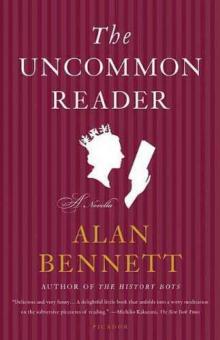 The Uncommon Reader: A Novella
The Uncommon Reader: A Novella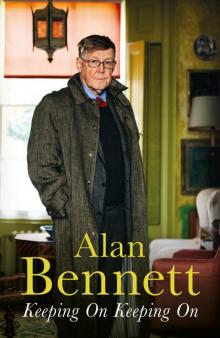 Keeping On Keeping On
Keeping On Keeping On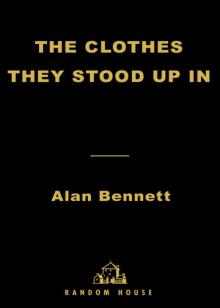 The Clothes They Stood Up In
The Clothes They Stood Up In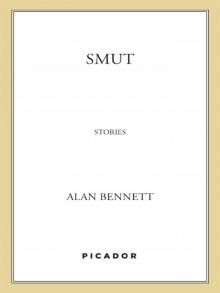 Smut: Stories
Smut: Stories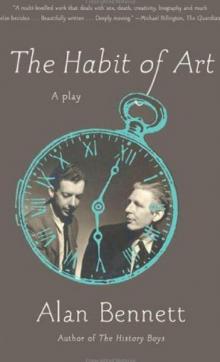 The Habit of Art: A Play
The Habit of Art: A Play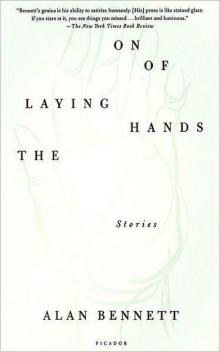 The Laying on of Hands: Stories
The Laying on of Hands: Stories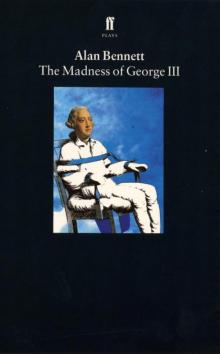 The Madness of George III
The Madness of George III Writing Home
Writing Home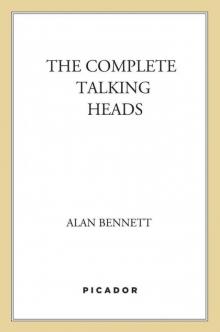 The Complete Talking Heads
The Complete Talking Heads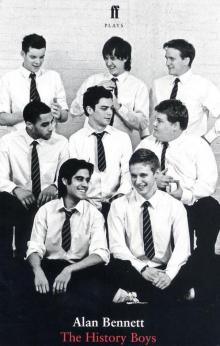 The History Boys
The History Boys Lady in the Van
Lady in the Van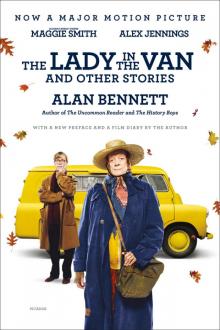 The Lady in the Van
The Lady in the Van Four Stories
Four Stories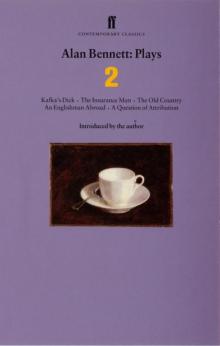 Alan Bennett: Plays, Volume 2
Alan Bennett: Plays, Volume 2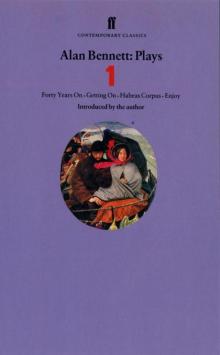 Alan Bennett: Plays, Volume 1
Alan Bennett: Plays, Volume 1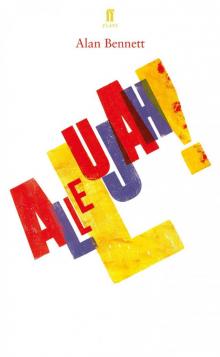 Allelujah!
Allelujah! Untold Stories
Untold Stories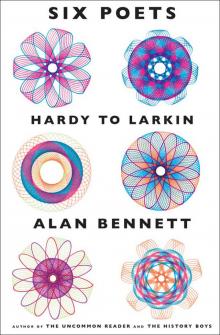 Six Poets
Six Poets